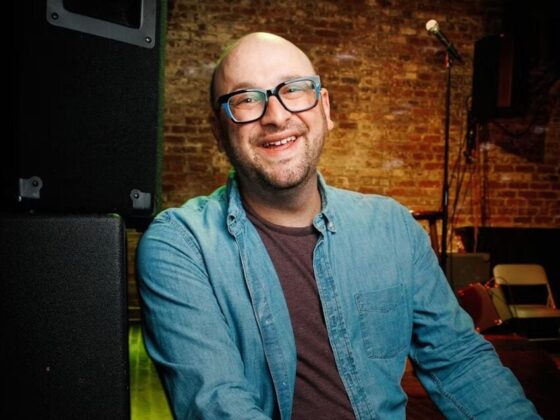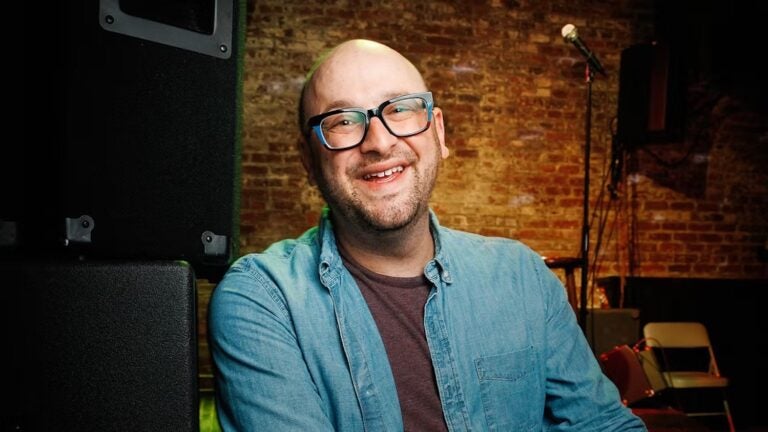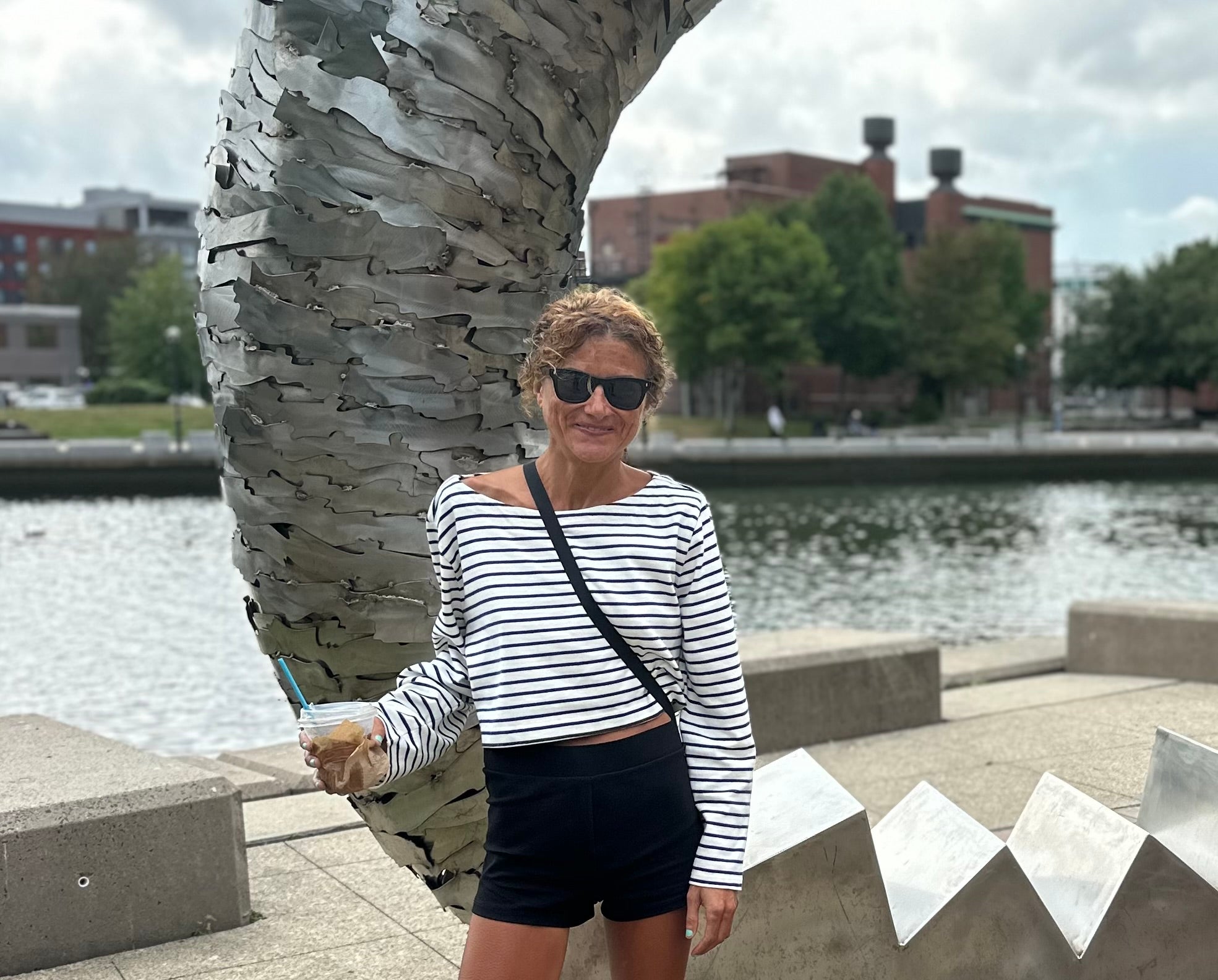No products in the cart.

Mass. Emmy-winner Josh Gondelman talks ‘Seinfeld,’ his Dunkin’ sneaker collection, and elder millennial life
You can watch the Stoneham native’s new special June 27, and see him July 2 at Harvard Books.

I kid you not, children: We used to pay a dime per text like a telegram.
Our first computer game in Kindergarten was pretending to be a 19th century pioneer in a pixelated covered-wagon pulled by oxen. We were told to go to Oregon. The computer would tell us our friends died, one by one: of diphtheria, dystenary, typhoid fever. Eventually we drowned in a river, our raft splintered against rocks.
Netflix arrived by mail, one movie at a time, and it blew. Our. Minds.
To be an ’80s baby in 2025 is to have tales like the Grandpa Simpson meme.
Advertisement:
And my fellow elder millennial Josh Gondelman, 40, wants to talk about it.
“We came of age at the turn-of-the-century. ‘Turn-of-the-century’ is such a silly-sounding thing to say about 1999: when Limp Bizkit ascended,” the Stoneham native tells me in an interview from his New York home.
Aging millennials are the theme of Gondelman’s new comedy special, “Positive Reinforcement” which drops June 27 at 8 p.m. on Blonde Medicine’s YouTube page. You can watch in full at the end of this interview. (I’ll pause here while you make popcorn.)
The audio album, with bonus material, streams July 11 everywhere comedy audio is streamed or sold.
Advertisement:
You can also catch him July 2 at Harvard Book Store in conversation with his wife, essayist Maris Kreizman, on her new essay collection, “I Want to Burn This Place Down.” Yes, some essays are about her husband. No, he hasn’t read them yet. (This could get interesting. Bring more popcorn.)
The Stoneham High ’03 and Brandeis ’07 alum wrote for HBO’s Emmy-winning “Last Week Tonight with John Oliver” and the Emmy-winning “The Marvelous Mrs. Maisel.” He’s the former head writer/executive producer for “Desus & Mero” on Showtime, a regular panelist on NPR’s “Wait Wait… Don’t Tell Me” and, for my money, just as mind-blowing: co-founder of the long-ceased Modern Seinfeld Twitter account. (It was gold, Jerry, gold.)
The four-time Emmy winner, who cut his teeth as a stand-up in Boston, has a reputation as a sweetheart, the nicest guy in comedy: (Website homepage: “Comedian. Writer. Pal.”)
I called Gondelman — he really is nice — ahead of his big week for a wide-ranging interview. We talked “Seinfeld,” MapQuest, Y2K, John Oliver, “Good Will Hunting,” and his Dunkin’ sneaker collection — I’m green with pink-and-orange envy.
Boston.com: So what sparked this new special?
Josh Gondelman: Coming out of the pandemic and performing live again, it really jumped out at me: “Oh. I’m one of the older guys now.” A big part of aging gracefully is the intellectual and philosophical gracefulness of accepting change and embracing new things when they’re good. But to know that I don’t have to say: “Cryptocurrency is new, and that’s beautiful.”
[laughs] Right.
I was performing in Bloomington, Indiana, a college town, and there was a young woman in the front row. I told a Y2K joke; I could see something in her face. I said, “When I say Y2K, does that have any meaning to you?” She said, “No.” And then I had to explain Y2K: “We thought all the world’s missiles would launch and all the computers would crash, because nobody thought a year would ever have 000 in it. Then it took this Herculean effort to make sure that didn’t happen.” It sounds ridiculous.
[laughs] So many things you mention feel specific to our generation, as elder millennials. We remember life before the internet, but we were also the first kids on AIM. ‘80s babies saw both sides.
Yes! I read somewhere that we’re the last generation to have had [offline] experience. When I was a kid, if I had to learn about something, I had to look it up in my parents’ set of World Book Encyclopedias from, I believe, the ‘60s.
Oh my god, ours too! [laughs] All our homework was from outdated information.
It’s so interesting: we thought the internet was going to solve this problem of misinformation by democratizing education — and now we’re fully the other way, where people are using ChatGPT as a search engine and getting not outdated information, but fully hallucinatory information that has never been accurate.
[laughs] That’s a great point. We grew up right at the cusp of when technology felt like it was growing to help us. Doing homework, it felt like nothing could be more cutting edge than Encarta 2000.
Totally! I remember — this didn’t last long— the laserdisc era, where it was like [uses Homer Simpson-like voice] “A music is CDs; a movie is big CDs.”
[laughs] Yes! We’ve seen so much technology come and go, like fruit-fly-lifespan-technology. Even iPods are obsolete.
Totally! I was talking to a friend recently about: what was the last technology that was basically good with minimal drawbacks. I came up with the GPS unit for your car that wasn’t your phone.
Yes. We went from Mapquest print-outs to this lady that talked to you, and was generally accurate. It was simple but life-changing.
Absolutely. It’s like: I’m so glad we did that — but we didn’t have to do NFTs. I think growing up is about taking in what’s new with an open heart, but maintaining skepticism. We don’t have to like something just because it’s new.
True. So going back to your roots: You got into comedy writing in high school.
Stoneham High had this big variety show each year. The class officers of each grade would write a sketch for their grade to perform. Freshman year I was Class Vice President — I don’t know why I ran, maybe I just wanted to be a part of this. Our sketch was a hit, and I coasted to victory as Class President for three years based on comedy writing.
[laughs] Nice. You started doing stand-up after freshman year at Brandeis. Where did you start out?
At Dick Doherty’s Beantown Comedy Vault, which no longer exists. My home clubs were the Comedy Studio, Improv Boston. Boston was a great place to start out because you can do every type of show: a hip independent room in Cambridge, a big comedy club in Boston proper, fundraisers in Italian restaurants. I really appreciated that cross-training.
You worked a stint as a preschool teacher, then moved to New York City in 2011. How’d you get “Last Week Tonight”?
I started there in 2014 when the show launched. I started doing their social and digital writing. That was my foot in the door. After the first season, I was moved to staff writer. John is wonderful; Tim Carvell is a brilliant executive producer. They’re such a special team. I learned so much there.
What was that writing experience like? How does the show work with story ideas?
Everybody on the show can [pitch a story]. John and Tim would have fascinations: “Oh, I read a story, let’s look into this.” We weren’t looking to echo a narrative in the media. It was: Is there something we can add? Is there a common misconception we can talk about?
Advertisement:
It had to be something John felt compelled to talk about in the first-person with his face and name attached. That was the bar to clear. I learned so much about joke-writing. They’re scrupulous about making sure the jokes aren’t undermining the story, but enhancing it.
How did you land the job as their social media writer?
I’d been doing a lot of stand-up, occasionally someone would give me an opportunity to apply for a late night show. Then I had this viral social media success– my friend Jaclyn Moore and I had a parody Twitter account.
Oh my god. Modern Seinfeld.
Yes!
I was obsessed.
Oh, thank you. It was so silly, and it got a lot of attention, and pushed me into a position where I was able to get my foot in the door more places. I got some freelance work writing jokes for “Billy on the Street” with Billy Eichner.
That show was hilarious.
It was so great, and really buoyed my spirits. Then six months later, I got “Last Week Tonight.”
You were there five years, then left for “Desus & Mero” on Showtime.
“Last Week” was a wonderful job with wonderful people, and a lot of staring right into the mouth of hell.
I can’t imagine. It must have been so heavy at times.
Extremely heavy. We did one on the opioid epidemic, and there’s so little that’s funny at all. You have to write jokes about the saddest things that have ever happened in the world, and figure out how to do that with grace. It’s delicate work. I thought: if I ever want to do any different kind of comedy writing, I should keep my ear to the ground.
Advertisement:
At “Desus & Mero” I developed different kinds of muscles. It was wonderful. I was there for four seasons, and then was a stand-up consultant on the final season of “The Marvelous Mrs. Maisel.”
I have to ask about Modern Seinfeld. I’m a diehard Seinfeld person. It was my favorite show as a kid, still one of my favorites. You guys nailed the updated plotlines.
My friend Dan always said — and it’s true— “If they had cell phones, you would lose half the episodes.” I thought: But think about all the episodes you’d gain. Because it’s not just “We can’t find each other in this movie theater” — it’s the etiquette of using this technology.
When the WiFi George usually steals suddenly has a password, he becomes addicted to trying to “hack” in. J:“Just get your own!” G:“NEVER!”
— Modern Seinfeld (@SeinfeldToday) May 5, 2015
Exactly. Larry David wanting to get off the text chain on “Curb Your Enthusiasm.” [“Too many dings!”] Or “The Accidental Text on Purpose.”
I tweeted a couple from my own account. My friend Jaclyn was like, “This could be something.” We started @Seinfeldtoday — we were both plugged in on comedy Twitter and media Twitter. It blew up overnight. We stopped doing it [in 2015] when we got too busy, but it was a great calling card. It opened a bunch of doors.
Favorite plotlines?
One was something like: “Jerry had to break up with his girlfriend because her phone automatically connected to Newman’s Wi-Fi.”
I remember that one!
One of the earliest ones was like: “Elaine’s neighbor makes his WiFi password an insult about her after they break up so the whole building will see it.”
[laughs] That’s good. We’re also a generation that grew up on “Seinfeld.” My cousins and I quoted it endlessly as kids. Was it formative for you?
Totally. It was one of the first things I got into where I thought: “Oh, this is what the grown-up world is like.” Obviously, it’s not really — but in some ways it kind of is. I grew up with this warped sense of how much scheming and machination is required to be an adult, just because of how much George Costanza informed my lens on the world.
[laughs] Things I laughed at in 7th grade, I still laugh at.
Same. It was huge for me. My wife was under-the-weather a couple months ago and I said, “Why don’t we just throw on something familiar.” She gave this little cough and said weakly, “Put on ‘Fusilli Jerry.’”
[laughs] I love that. So I have to ask about your Dunkin’ Sauconys. You were in GQ as a Dunkin’ clothing-influencer. You’re a noted hardcore Dunkin’ fan.
OK, so I have several pairs of Dunkin-adjacent sneakers. The ones you’re talking about were their collab with Saucony for the Boston Marathon. I don’t wear them much because I could never replace them.
Advertisement:
I also have a pair of New Balances that have Dunkin’ colors— not an authorized collaboration, just coffee brown with the pink and orange on the “N.” And I have a pair of Air Max 90s in Dunkin colors. They went on sale, and I was like, “I’m gonna get a second pair for when I run through the first.”
This is peak Boston. Do you ever get guff from people about leaving Boston for New York?
Only once. I was opening for John Oliver at The Wilbur in 2014. I said to the crowd, “It’s very meaningful for me to be here with you. This will always feel like home.” I get a nice round of applause. Then I said, “That said, I did move to New York City three years ago because I wanted to be happy and successful.”
[laughs]
I got booed and booed. I said, “No. You aren’t allowed to boo. You could also leave if you wanted those things. ‘Good Will Hunting’ isn’t science-fiction.” And I got booed and booed. I did my next bit, got a little applause, and said, “No. You already decided you were against me. I don’t want your applause.”
[laughs] You’ll be back here July 2 at Harvard Book Store in conversation with your wife, Maris Kreizman, on her new essay collection. She’s from New Jersey. How did you two meet?
This is an extremely 2014 sentence: We met at a party Maris was throwing to celebrate the five-year anniversary of her successful Tumblr blog.
Watch the full Gondelman special here starting 8 p.m. Friday, June 27:
[embedded content]
Lauren Daley is a freelance culture writer and regular Boston.com contributor. She can be reached at [email protected]. She tweets @laurendaley1, and Instagrams at @laurendaley1. Read more stories on Facebook here.
Sign up for the Today newsletter
Get everything you need to know to start your day, delivered right to your inbox every morning.





